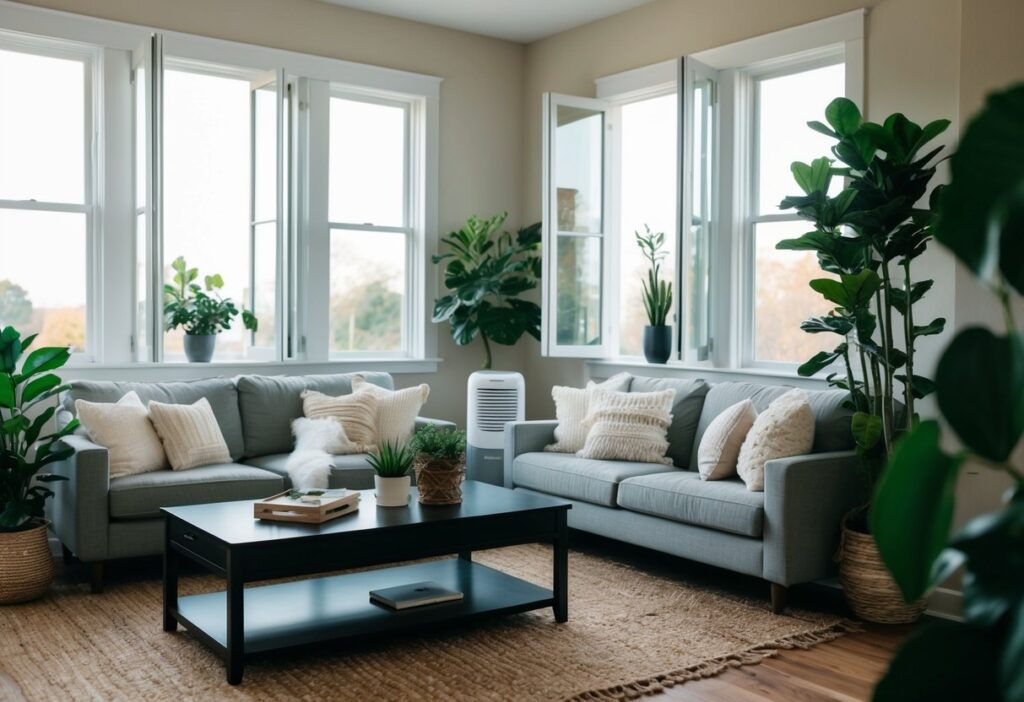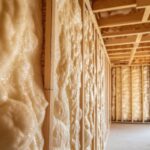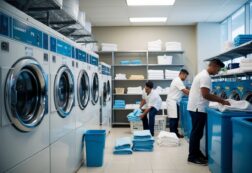
As the holiday season approaches, many people focus on decorating and preparing for celebrations. However, it’s essential to consider the quality of the air in their homes during this time. Preventing indoor air pollution can significantly enhance the well-being of family members and guests.
Indoor air quality can be affected by a variety of factors, including household cleaning products, candles, and even holiday decorations. By making informed choices and implementing simple strategies, individuals can create a healthier environment that allows everyone to enjoy the festivities without compromising their health.
Awareness of common sources of indoor air pollution and proactive measures can lead to a more enjoyable and safe holiday experience. Emphasizing the importance of clean air will transform a home into a welcoming space that fosters both comfort and joy.
Understanding Indoor Air Quality
Indoor air quality (IAQ) is crucial to maintaining a safe and healthy living environment. Various factors contribute to air quality, including pollutant sources and the health implications of exposure.
Sources of Indoor Air Pollution
Indoor air pollution can arise from several sources, which can be categorized into biological, chemical, and physical pollutants. Common biological pollutants include mold, dust mites, and pet dander. These are often found in carpets, upholstery, and bedding.
Chemical pollutants can originate from household products, such as cleaners, paints, and pesticides. Volatile organic compounds (VOCs) are a significant concern, as they can evaporate into the air from various materials, including furniture and building materials.
Additionally, physical pollutants like tobacco smoke and combustion products from stoves and heaters can significantly impact IAQ. Efficient ventilation systems and regular cleaning practices are essential in mitigating these sources.
Health Effects of Poor Air Quality
Exposure to poor indoor air quality can lead to a range of health issues. Short-term effects may include headaches, dizziness, and eye irritation. Individuals with asthma or allergies may experience aggravated symptoms, resulting in increased discomfort.
Long-term exposure can result in more severe health problems, such as respiratory diseases and cardiovascular issues. Certain pollutants, like formaldehyde, are recognized carcinogens and can pose serious risks over time.

Particularly vulnerable populations include children, the elderly, and those with pre-existing health conditions. Implementing strategies to improve IAQ is vital in protecting overall health and well-being.
Improving Ventilation and Air Filtration
Effective ventilation and air filtration are essential for maintaining healthy indoor air quality. Implementing these solutions reduces pollutants and allergens, promoting a safer holiday environment.
Natural Ventilation
Natural ventilation relies on outdoor air to circulate through the home. Opening windows and doors can enhance airflow, especially in mild weather. Utilizing cross-ventilation, where air enters through one side of the home and exits through another, maximizes air exchange.
To optimize this method, consider the orientation of the house and local wind patterns. Additionally, incorporating vents in strategic locations can improve air movement. Plants can also contribute by absorbing toxins and releasing oxygen, further improving indoor air quality.
Mechanical Ventilation Systems
Mechanical ventilation systems provide a controlled way to exchange stale indoor air with fresh outdoor air. Options include exhaust fans, supply fans, and balanced systems.
Key types include:
- Exhaust fans: These remove air directly from specific areas, like kitchens and bathrooms.
- Supply systems: Introduce fresh air into the home, maintaining positive pressure.
- Balanced systems: These replace the air exhausted with an equal amount of fresh air.
The installation of these systems should be performed by Conyers’ most trusted HVAC company to ensure optimal performance. Proper setup can substantially reduce humidity and airborne contaminants.
Air Filtration Solutions
Air filtration is vital for trapping pollutants and allergens. Installing high-efficiency particulate air (HEPA) filters can capture 99.97% of particles as small as 0.3 microns.
Homeowners can choose from various filtration options:
- Mechanical filters: Capture dust and pollen.
- Activated carbon filters: Adsorb gases and odors.
- UV light filters: Kill airborne microbes and bacteria.
Regular maintenance, such as changing filters every 1-3 months, is crucial. Employing these filtration solutions alongside ventilation strategies enhances overall air quality, ensuring a healthier indoor environment during the holiday season.
Maintaining HVAC Systems for Optimal Performance
Proper maintenance of HVAC systems is essential for ensuring optimal performance and improving indoor air quality. Regular checks and professional services play a critical role in maintaining system efficiency, especially during the holiday season.
Regular HVAC Maintenance
Regular maintenance includes changing air filters every 1-3 months. Clogged filters can reduce air flow and trap pollutants. Inspecting and cleaning the ducts also ensures that dust and allergens do not circulate throughout the home.
Additionally, checking the thermostat can prevent energy waste. Keeping it calibrated helps maintain consistent temperatures. Homeowners should also visually inspect the system for any signs of wear, such as rust or leaks.
Routine maintenance helps extend the lifespan of the HVAC system and promotes a healthier home atmosphere.
Professional HVAC Services in Georgia
In Georgia, professional HVAC services provide essential support for homeowners. Experienced technicians can perform thorough inspections and identify potential issues before they become significant problems.

Services often include comprehensive cleaning, system diagnostics, and recommendations tailored to local climate conditions. Regular check-ups can help maintain system efficiency and air quality.
Homeowners are advised to choose licensed professionals who are familiar with Georgia’s unique environmental considerations. Reliable maintenance services can provide peace of mind during the holiday season, ensuring a safe and comfortable home environment.
Reducing Pollutants During the Holidays
During the holiday season, indoor air quality can deteriorate due to decorations and cooking. Taking specific measures can help minimize these pollutants.
Choosing Safer Decorations
Selecting decorations carefully can significantly impact indoor air quality. Opt for natural or organic materials for decorations instead of synthetic options that may release volatile organic compounds (VOCs).
Consider using LED lights, which are more energy-efficient and generate less heat. If using artificial Christmas trees, look for options labeled as PVC-free.
Avoid aerosols and artificial fragrances in decorations and sprays, as they can contribute to poor indoor air quality. Instead, use natural items like pinecones, fresh greenery, or essential oils sparingly.
Minimizing Pollution from Holiday Cooking
Cooking is a significant source of indoor air pollutants, especially during the holidays. Employing certain strategies can limit these emissions.
Ventilation is key. Using an exhaust fan or opening windows while cooking helps disperse smoke, odors, and airborne particulates.
Choose cooking methods wisely. Baking and roasting generally produce fewer pollutants than frying or grilling. When possible, prepare meals in advance to reduce cooking time during gatherings.
Clean regularly. Grease buildup on surfaces can release harmful particles when heated. Using non-toxic cleaners can further avoid introducing harmful chemicals into the air while maintaining a clean kitchen.












